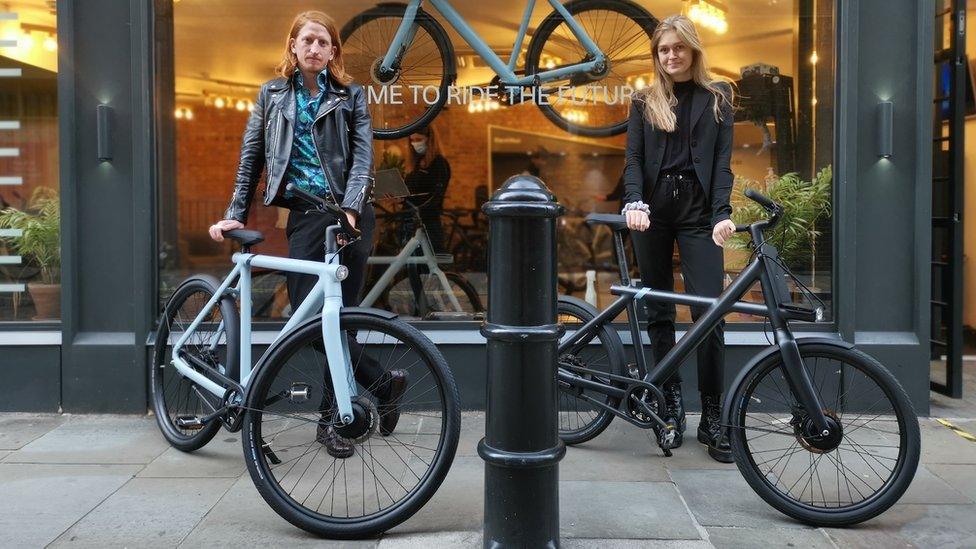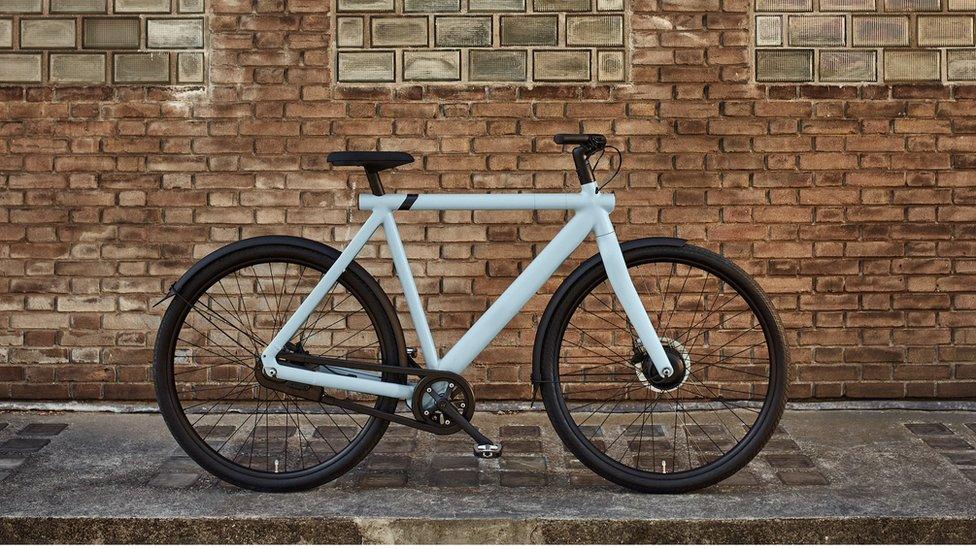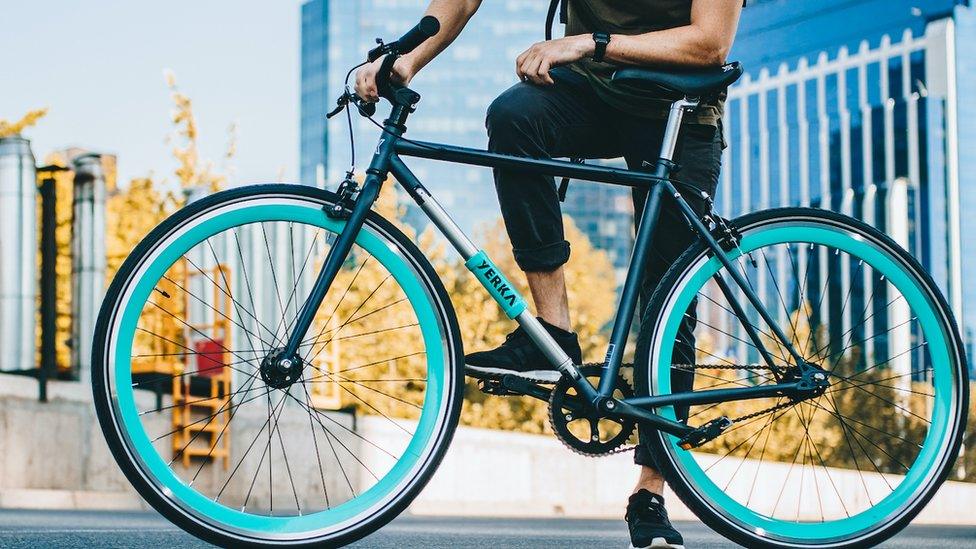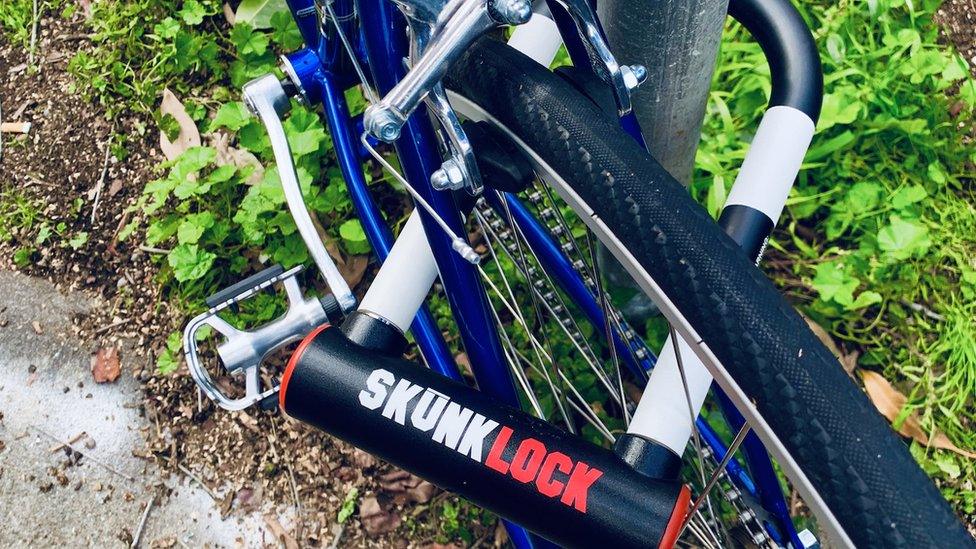Detectives and noxious locks take on bike thieves
- Published

Leigh Richards and Helena Maersk
Helena Maersk is on her first bike hunt.
Normally, she sells electric bikes. But one night in July, while she partied in Camden, her bike was stolen.
So she joined the reconnaissance team of her bike firm, VanMoof, to try to track down her lost set of wheels.
Using her smartphone she zeros in on a beacon that pings the bike's location.
The tracking system shows her the bike is somewhere in a set of buildings, so Helena and her partner stop to gather more information.
Local shopkeepers and restaurant owners say they haven't seen the bicycle, but then a piece of luck. A bin man says he has spotted the unusual silver bike frame at a caravan park.
At this stage, to give them a bit of authority the two put on company uniforms, with portable cameras attached, and head to the park.
The gate is locked and there is no bell, so they yell "hello" through the gates. A lady appears and stares through the metal bars, clutching at her pink coat.
"That's our bike, the silver one and we can either take it or we'll have to call the police," they say.
She agrees to fetch her father, who emerges from one of the trailers, opens the gate and tells them to take it back.
"Somebody left it there," he says.
They unearth it from a pile of 30 other bikes.
As they pedal back to the London shop front, they share a bag of Maltesers in celebration.

"We want to prove to thieves that our bikes aren't worth stealing," says VanMoof's Leigh Richards
Helena's bike was made by VanMoof, which builds anti-theft measures throughout the whole bike. If the frame number has been scrubbed away, its signature Bluetooth address is still traceable from a smartphone.
The wheels are secured with special theft preventative nuts. It becomes useless as an electric bike the moment it is stolen. And, the bike is easily tracked.
If the alarm or the flashing skull sign does not deter a would-be thief, VanMoof offers a £270, three-year service, that will send a team out to chase down your stolen bike.
If they don't find it within two weeks the company will replace the bike for free.


"We want to prove to thieves that our bikes aren't worth stealing," says Leigh Richards, VanMoof's UK brand manager.
Even if they are dissuaded from going after VanMoofs, there are still rich pickings for bicycle thieves.
The coronavirus pandemic has seen a spike in bike sales, with Halfords reporting a 57% jump in revenues during the 13 weeks leading to 3 July.
At the same time, bicycle thefts have also surged. According to BikeRegister UK. September alone saw a 57% increase on the same time last year
Increasingly, consumers are looking for products that incorporate advanced security measures.

Yerka designs its bikes to be "too complicated" to steal
Yerka, a Chilean bicycle company that sells its cycles globally, also has theft prevention at the heart of its design.
The Yerka's frame separates into two parts. The seat detaches and slides through to the lower bar to lock. If the lock is cut, the bicycle and its seat are ruined.
Like the VanMoof, Yerka's wheels are secured with specialised nuts. If the bike is stolen in the first two years, they will replace it for free.
Last year, only two were taken.
"We want thieves to think this bike will be too complicated to steal," says Andrés Roi, one of the company's three founders.

If broken the Skunklock gives off a foul-smelling gas
Others have taken a more creative approach to bike security. Daniel Idzkowski's SkunkLock is branded "the lock that fights back", and is definitely meant to scare off a would-be bike poacher.
Mr Idzkowski, who himself has had eight bikes taken in the last 15 years, was out to lunch with a friend whose bike was stolen. The cycle was well-locked with one of the most expensive D-locks on the market.
"Why isn't there a lock that just blows up?" Mr Idzkowski said at the time, his temper exploding, before he realised he was on to a good idea.
Using food-grade chemicals and the guidance of a team of scientists, Mr Idzkowski created a lock that, when cut into, emits a gas so foul smelling it induces vomiting.
In a sign of his dedication to innovation, Mr Idzkowski tested the product himself.
"I only had to experience it once myself to know, okay, we have something here that will work," he says.
The San Francisco-based company has been active since 2016, but this October the first ever bike that was locked with a SkunkLock was stolen.

Daniel Idzkowski had eight bikes stolen in 15 years
To avoid the lock, the criminals destroyed the entire bike rack instead.
Mr Idzkowski hopes this proves a more democratic solution for those that can't afford high-end bicycles.
"If you had a $50 bike that you had since you were a kid, that meant the world to you, I wanted to make something that would protect that," he says.
Over half of stolen bikes that are not abandoned or kept by the thieves, wind up on ecommerce sites like Ebay and Gumtree, according to a recent report from London's Metropolitan Police.
A large number of those are being sold by organised crime groups involved in county lines drug dealing, with some even going abroad.
Even if a stolen bike is recovered by police, there's no guarantee it will be reunited with its owner as relatively few bicycles are registered to the national cycling database, which is accessible to police.
For £12-30, BikeRegister will either give you a serial number on a sticker or print a number which can only be detected by UV light.
While many retailers maintain databases of owners - that also enable them to market to members - such records are not searchable by UK police forces.
Superintendent Mark Cleland, the national lead for cycle crime, says if more people added their details to BikeRegister, it would not only aid in the recovery of many more bikes, but also begin to choke the thieves, reducing the ease with which criminals can shift stolen property.
Regulation could help too, he adds. He suggests the government could make removing a product serial number an offence.
"That would make it nigh on impossible to sell stuff on," he says.